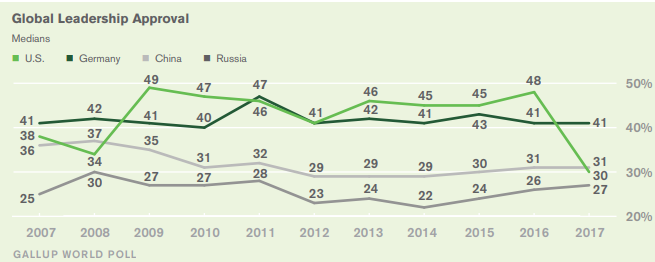President Donald Trump’s unpopularity overseas could be lowering American exports by billions of dollars as foreign demand for U.S. goods moves in tandem with international respect for the Oval Office, according to a new study from the University of California, Berkeley.
The study looked at imports and exports data from over 200 countries between 1948 and 2017 along with Gallup approval polling data for the leadership of five exporters by participants in 157 countries between 2006 and 2017.
Andrew Rose, a professor and economist at Berkeley’s Haas School of Business Administration, used a total of 6,411 Gallup observations available for the percentages of participants approving and disapproving of the leadership for foreign countries. He supplemented that with surveys from the BBC and the Pew Research Center.
Combining those two datasets, Rose estimates that the roughly 20 percentage point decline in foreign approval of American leadership between 2016 and 2017 lowered American exports by at least $3 billion.
“Countries whose leadership is approved abroad tend to sell more exports, holding all else equal,” Rose wrote. So-called soft power — the ability of one country to attract or win over citizens in another — is a significant determinant of export demand.
In other words, countries buy more goods from countries with leaders they respect.
That may prove problematic for Trump, whose first year in the Oval Office was marked by a plunge in overseas approval ratings.
The median global approval rating of the job performance of U.S. leadership across 134 countries stood at a new low of 30 percent, according to a 2018 Gallup report. That was down nearly 20 points from the 48 percent approval rating in the last year of President Barack Obama’s administration, and 4 points lower than the previous low of 34 percent in the last year of President George W. Bush’s administration.
Trump’s average domestic approval rating — which hovers around 40 percent — is also lackluster when compared with his predecessor’s.
“An increase of one percentage point in net (American) leadership approval boosts (American) exports by around one one-hundredth of a percent,” Rose wrote. It’s an “economically large effect, given that swings in leadership approval are often over twenty percentage points, as occurred both when Obama succeeded Bush in 2009 or when Trump succeeded Obama in 2017.”
The economist noted that that calculation is conservative if countries that are large importers of American products also disapprove of Trump disproportionately.
The International Monetary Fund data cover bilateral trade between over 200 countries between 1948 and 2017, while Gallup’s rating metrics — a proxy for soft power in this study — provide annual percentages of approval and disapproval.
“The drop in foreign approval for leadership in 2017 compared with the eight previous years is a phenomenon unique to the United States,” the economist wrote, pointing to little changes in foreign perception of German, Chinese and Russian leadership over the past several year.
Rose, who has been at the University of California for more than 30 years, previously worked at the World Bank, the U.S. Treasury Department and at central banks in more than one dozen countries around the world. He holds at Ph.D. in Monetary Economics from the Massachusetts Institute of Technology.
In a prior study, Rose found that holding other things constant, a country’s exports are higher if it is perceived by the importer to be exerting more positive global influence. That positive effect was found to be both statistically and economically significant; a 1 percent net increase in perceived positive influence raises exports by around 0.8 percent.
The United States, which had been the top-rated global power in 2016, fell 18 percentage points during Trump’s first year in office and surrendered the No.1 spot to Germany. Foreigner approval of American leadership is now on even footing with that of China and slightly ahead of that of Russia.
Such swings in overseas approval can manifest themselves in economic relationships, Rose added. The average net approval by foreigners of American leadership declined from 16.6 percent in 2016 to a negative 7.4 percent in 2017, the study found. That swing of 24 percentage points in net approval would be expected to lower American exports by 0.22 percent, or $3.3 billion.
This so far hasn’t fazed Trump, who has launched a handful of high-stakes trade disputes with U.S. economic partners shortly after his inauguration in January 2017. Between levies on steel and aluminum imports, redesigning the North American Free Trade Agreement and a bitter tit-for-tat economic skirmish with China, Trump has tried to coerce allies into new agreements that narrow the American trade deficit. Trump’s disdain for the NATO military alliance is likely not helping his image in Europe.
tweet
The president has had mixed success with the punitive-heavy approach, though its overall effect on the trade deficit remains questionable.
The U.S. trade deficit reached its highest level in 10 years in October (the latest data available), according to the U.S. Department of Commerce. China — a country Trump has singled out as one of Washington’s biggest economic threats — announced on Monday that its 2018 trade surplus with Washington was its largest in more than a decade.
“It is ironic that one effect of the loss of American soft power associated with President Trump — a man obsessed by the trade deficit — is lower American exports,” Rose said.
WATCH:Trump’s economy: Here’s where he gets credit, and what could go wrong
NOTE: You can not find the right trading strategy? if you have no time to study all the tools of the trade and you have not funds for errors and losses – trade with the help of our best forex robot developed by our professionals. We offer forex robot free download. Signal2forex reviews


 Signal2forex.com - Best Forex robots and signals
Signal2forex.com - Best Forex robots and signals




